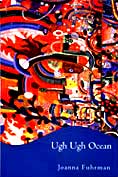
Thomas Fink reviews
|

In the longish sequence ‘Admonitions,’ Joanna Fuhrman announces that ‘BAD STUFF/ STILL HAPPENS/ EVERYWHERE’ and ‘We are going/ Everywhere at once/ At the speed of a dark/ Question mark and/ Grammar will not help’ (29). Ugh Ugh Ocean, her second collection, responds to the ‘bad stuff’ and the uncertainty by furnishing a witty, surreal environment, where ‘Pigeons arrive at my window in leg braces’ (‘May 26, 2000,’ 65), and delightfully useless aphorisms abound: ‘They say: cut open the intestine to feel intense’ (‘Fable’ 43). This is a locus where lively linguistic imagination and ironic desedimentation can refresh the weary traveler. Self-management, for Fuhrman, never changes the ‘dark/ Question mark’ into a confident period, but it makes for comic pathos: ‘I decided to mark my shoes. ‘Happy’ on the left foot. ‘Sad’ on the right’ (‘Knowledge Blobs’ 23). |
If the quality of art depends on the degree of emotion
If much art aims to induce emotional catharsis, its status as mediation — as a re-view that a reader/spectator re-re-views — disables this effort to the extent that this secondary experience cannot and perhaps would be lethal as ‘real suffering.’ Instead of a singular emotional pitch, poetry can ‘inflict’ both secondary emotion and thinking about the causes and effects of emotion. Board a voice.
Since the poet probably adopts the view that no single version of a self necessarily fits a particular individual’s multiplicity, this passage can be said to refer to the strategy of adopting an available ‘voice’ provisionally and figuring out what effects it might produce. The voice of masochism is one possible choice, and the ‘freedom’ afforded by this move is especially enigmatic, because ‘a dash’ could signify a burst of energy, simple, neutral evidence of transition, or physical dismemberment/ destruction, while a single written ‘letter’ of the alphabet, an entire epistle, or legibility itself (often opposed to ‘spirit’) could be the object ‘crumpled.’ And need I even mention the ambiguity in ‘line’? ‘Belief’ in ‘trees’ may involve a faith in rooted, organic experience or, more likely, in a branching from any center. |
|
August 2003 | Jacket 23
Contents page |